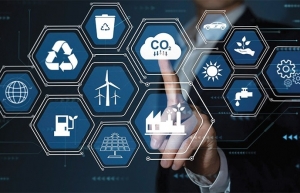The path to carbon neutrality: what matters beyond ESG investments?
The American-style black comedy Don’t Look Up satirises the chaos that unfolds in the six months leading to catastrophe. What made the viewing experience so heavy was how little it differs from reality. The comet’s impending collision in the film symbolises the real-world climate crisis.
 |
| Juhern Kim, country representative to Vietnam Global Green Growth Institute |
This year has been a pivotal one. It marked an important phase of economic recovery from the pandemic, boosted by major developments in the environmental, social, and governance (ESG) investment space. By November 2023, allocated assets to exchange-traded funds, which included ESG goals in their strategy, exceeded $480 billion. Global issuance of green, social and sustainability bonds reached approximately $850 billion in 2023.
Globally, coalitions such as the Net-Zero Asset Managers Initiative, with over 315 global asset managers, including the world’s largest asset management firm Blackrock, are setting targets for companies to link their business models to net-zero targets, further integrating climate goals into corporate strategies.
However, the question remains: are these massive investments delivering real impact? The question is not about whether companies with higher ESG ratings are more profitable than others. Instead, the focus should be on whether the exponentially growing funds are leading to an exponential reduction in climate risks, such as greenhouse gas (GHG) emissions.
Moreover, given the time lag between when investments are made, projects are executed, and impacts are realised, there are two critical points we should be reminded as 2024 comes to a close.
The first point is the time constraint. If we do not achieve carbon neutrality by 2050 and limit global temperature rise to below 1.5°C compared to pre-industrial levels, the rise and the resulting ecological destruction will reach a tipping point, leading to an irreversible state.
That is a key conclusion from the Intergovernmental Panel on Climate Change. We have already received enough warnings from the unprecedented viruses crossing into human society due to ecosystem destruction, and from wildfires, heatwaves, floods, and typhoons caused by abnormal weather patterns.
We are dealing with this matter with urgency. There are two immediate actions required. The priority is to rapidly invest in areas that can immediately reduce GHGs. There remains enormous untapped potential in available options. These include expanding renewable energy sources like solar and wind, transitioning to electric vehicles, plastic recycling, waste management, and improving carbon reduction through agricultural practices and nature-based solutions that preserve ecosystems and biodiversity. Divesting from coal, oil, and natural gas power generation is also a part of areas to immediately reduce GHGs. It is critical that climate and ESG funds are directed first and foremost to areas where real, measurable impact can be achieved. This is particularly important for emerging markets.
Equally important, the actions related to investments in climate tech ventures are essential in emerging technologies like carbon capture, utilisation, and storage (CCUS); hydrogen and ammonia power generation; small modular reactors; and several new solutions paired with the recent development with AI.
These are all featured in global net-zero scenarios, but they remain far from being fully commercialised – we need to accelerate this.
IT’S THE IMPACT!
The second point is that we must assess impacts beyond financial performance. We need to confirm whether the use of investment funds is truly contributing to GHG reductions, improving air quality, and creating new jobs. In Don’t Look Up, the only solution to destroying the comet is abandoned because a business leader and the president prioritise the comet’s potential natural resources – which presents new business opportunities – over the safety of the planet. Similarly, while the climate crisis is indeed generating new business opportunities, we must be careful not to let profit-driven motivations overshadow the need for genuine environmental impact.
Greenwashing – the act of misleading people into thinking a company is doing more for the environment than it really is – is becoming a rising issue. Globally, there are cases of power companies running coal-fired power plants that promote themselves as eco-friendly with the use of high-efficiency, low-emission technology.
But even if efficiency improves, the fundamental issue of GHG emissions remains unchanged. Some companies falsely claim to have reached net-zero by focusing on growth rate reductions instead of absolute emissions. Liquefied natural gas companies, for example, may claim to handle some emissions through CCUS and offset the rest via carbon credit trading. However, these solutions are based on unproven assumptions, and CCUS technology itself is not yet reliable at capturing significant amounts of CO2, at least as of today.
Consumer product companies are no exception. According to the United Kingdom’s Competition and Markets Authority, as of 2023, 40 per cent of online green claims across sectors such as fashion and fast-moving consumer goods are misleading. In South Korea, its Consumer Agency has also been active in tackling exaggerated or false claims related to eco-friendly products, particularly in personal care and household goods sectors. ESG investment funds must not flow into companies engaging in such practices, and increased vigilance is required.
The key difference between Don’t Look Up and reality is that, unlike in the film, we still have time to act. As we end 2024, the mood in Vietnam is cautiously optimistic. The approval of a direct power purchase agreement is a major step forward, enabling industries – especially foreign-invested enterprises – to directly purchase renewable energy, which could significantly boost the country’s renewable energy capacity.
At the same time, the GGGI, together with other development partners, is ramping up support for green bond issuance, helping banks and companies finance green and sustainable projects, while climate tech startups acceleration is gaining momentum with the partnership with venture and impact investors.
The 2050 deadline is set in stone. Beyond profits and national interest, we must focus on whether ESG and climate investments are delivering tangible, meaningful impact. The recent pandemic has demonstrated that no country can solve humanity’s greatest challenges alone. When the consequences of climate change fully hit, investment returns, new business opportunities, and even national interests will be rendered meaningless. To ignore this time constraint is like saying Don’t Look Up as the comet approaches Earth.
In the film, Dr. Mindy (Leonardo DiCaprio) asks Peter (Mark Rylance), CEO of Bash, a pointed question when the business leader insists on a risky approach due to the value of the comet’s rare minerals: “What does all of this mean if we can’t stop the comet? What do these trillions of dollars even matter if we’re all going to die?”
*The views and opinions expressed in this article are those of the author and do not necessarily reflect the views or positions of any organisation
 | Flexible solutions crucial to develop carbon market: Deputy PM With its tremendous potential in renewable energy and the carbon market, Vietnam will be highly attractive to investors, Deputy Prime Minister Tran Hong Ha stressed, while addressing a meeting in Hanoi on August 22 on seeking ideas towards completing a draft plan on carbon market development in Vietnam. |
 | Suitable workforce craved for carbon credit market The plan to establish the first carbon credit exchange in 2025 places Vietnam with a huge task of training enough professional forces to participate in the market. |
What the stars mean:
★ Poor ★ ★ Promising ★★★ Good ★★★★ Very good ★★★★★ Exceptional
 Tag:
Tag:
Related Contents
Latest News
More News
- EVN awards EPC contract for Quang Trach II LNG project (February 10, 2026 | 09:00)
- Canada backs Vietnam’s green transition with AGILE project (February 09, 2026 | 17:41)
- Momentum is real in the race to net-zero emissions (February 02, 2026 | 08:55)
- $100 million initiative launched to protect forests and boost rural incomes (January 30, 2026 | 15:18)
- Trung Nam-Sideros River consortium wins bid for LNG venture (January 30, 2026 | 11:16)
- Vietnam moves towards market-based fuel management with E10 rollout (January 30, 2026 | 11:10)
- Envision Energy, REE Group partner on 128MW wind projects (January 30, 2026 | 10:58)
- Vingroup consults on carbon credits for electric vehicle charging network (January 28, 2026 | 11:04)
- Bac Ai Pumped Storage Hydropower Plant to enter peak construction phase (January 27, 2026 | 08:00)
- ASEAN could scale up sustainable aviation fuel by 2050 (January 24, 2026 | 10:19)




















 Mobile Version
Mobile Version